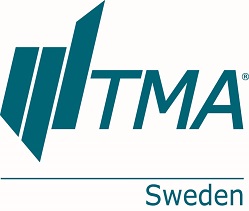On 17 May TMA Sweden held a much appreciated event on the theme of “Bad payers – cant’s pay, won’t pay”. The event was hosted by Björn Dahl of KPMG and held at KPMG’s offices on Tegelbacken in the city center of Stockholm. The debate was moderated by TMA Sweden board member Michael Maccallum, Head of Restructuring at Deloitte.
From left: Michael MacCallum (Deloitte), Carl Hugo Parment (White & Case), Oskar Ekenger (SEB), Todor Panayotov and Jeremy Lipshitz (PwC)
The panel consisted of Oskar Ekenger representing SEB’s Special Credits Management department; Jeremy Lipshitz who is a core member of the PwC Sweden Business Recovery and Restructuring practice; Todor Panayotov with vast experience from recovery, restructuring and balance sheet optimizations and Carl Hugo Parment, Partner with White & Case in Stockholm focusing on different aspects of banking and finance law, debt capital markets and financial restructuring/ insolvency.
The discussion commenced with the panelists identifying the first signs of a “bad payer” and pointed out initial triggers such as financial engineering, activation of extraordinary costs, factoring among others. Gradually debtors tend to avoid contact with creditors and the ultimate signs are the breaking of covenants.
The panelists were in consensus that the understanding of the debtor’s situation is key to a successful turnaround/solution. Lenders often have trouble understanding the gravity of the situation and the panelists expressed that they see a problem with lenders being too invested to allow themselves to understand. Therefore, knowing your customer goes beyond filling in paperwork; but actually understanding the complications and challenges of the debtor.
The question of directors’ liability in was raised and our panelist could (more or less unanimously) conclude that there are big differences in practice between the Nordics and the rest of Europe and not the least the USA. It is therefore important to “analyze your toolbox” before the situation has gone out of hand. This can include both drafting of contingency plans as well as “stripping the oxygen” at the right time.
All our panelists agreed however that reconciliation with a customer with payment issues is possible and sometimes these situations – if successful – lead to strong relationships between the parties.
The evening was ended with drinks and food sponsored by the generous host, KPMG.


